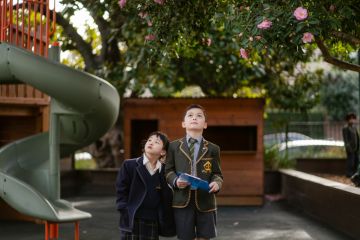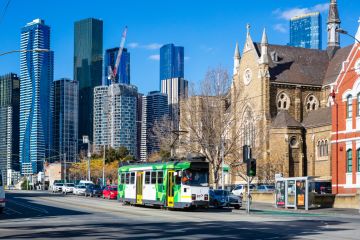How a young Melbourne couple built an eco-arts retreat in Tasmania

It’s a sentiment undoubtedly familiar to many Australians tired of the daily grind: wouldn’t it be nice to escape the rat race and just go live in a commune somewhere?
Enjoying a rural life might sound like a pipe dream to city dwellers, but young couple Elisse Kleiner and Alex Ross offer the chance to experience a temporary version of it first-hand at their Dreamfarm Eco-Arts Retreat in Tasmania’s Huon Valley.
After years of research, planning, and visiting intentional communities (planned residential groups with an emphasis on social cooperation and shared values) the pair decided to create something with a wider reach by offering short-term stays, rather than permanent homes.
“We’re trying to foster elements of community but not have it be a live-in thing where people are stuck where they are,” Kleiner says. “They can come and have an experience of community and then go back to their lives and hopefully make a positive change in some way.”
“We’re finding that our personal levels of wellbeing and authentic, meaningful happiness are so much greater out here than they were in our lives previously,” Ross says.
Dreamfarm hosts creative residencies for artists and environmental researchers, and will soon offer volunteer placements, workshops, and retreats. The couple hope that individuals who visit Dreamfarm will be encouraged to live simpler, less consumer-driven lives that are more focused on the environment and relationships with others.
The emphasis on art as well as eco-friendly living is key, they say, because both believe creative practices help people connect with nature and share ideas for a sustainable future.
The seeds for Dreamfarm were planted eight years ago, when Kleiner, a professional flautist who performs on a casual basis with the Melbourne Symphony Orchestra, participated in a three-month creative residency at the Banff Centre for Arts and Creativity in Canada’s Rocky Mountains.
- Related: The realities of living in the country
- Related: The couple building their home from straw
- Related: A new generation of country-dwellers
“That was a completely life-changing experience for me,” she says. Working out of little wooden studios on the side of a mountain, Kleiner and her fellow residents played music and collaborated as elk, deer, and occasionally grizzly bears would wander by.
“The fresh air, the silence, the snow; it all contributed to the creative experience,” Kleiner says. “I was ready to change the world with the power of classical music.”
Upon returning to her hometown of Melbourne, Kleiner met Ross, who was then helping run a creative arts base in Brunswick. They soon realised their shared dream of residing in a rural, arts-focused oasis.
“We spent a lot of time looking all over the world for examples of what we thought would fulfil us before we decided we couldn’t find it, and we’d create it ourselves,” says Ross.
Jumping in their van every weekend, the pair scoured sites across Victoria and New South Wales. They were after somewhere quiet and somewhat remote, but still accessible. They’d also decided they needed a property that already had liveable residences, in order to bypass a drawn out building phase.
Eventually they discovered a 26-acre farm located 45-minutes from Hobart in, to quote Ross, “the most ridiculous way”: listed on Gumtree’s Melbourne CBD section.
“It was advertising the property to rent as a bed and breakfast,” Ross says.
The couple visited in person, and took the farm on, first as renters and then as owners. Set in a valley with a creek flowing through the middle, the property gives way to a conservation area several kilometres up the road.
“Our neighbours joke that where we are is the gateway to the end of the world, because it doesn’t actually appear on some maps,” says Kleiner.
The couple have planted a kitchen garden where they grow as much food as possible, and are in the process of creating a master plan of the entire property, which is a requirement of any permaculture process. Placing an emphasis on gradual, comprehensive change is how they hope to inspire others.
“As long as we’re doing our best and improving systems as we go, then we’re happy,” Ross says.
There are individual studios for visiting artists to stay and work in. Spaces have been designed to encourage social interaction, and shared meals and group activities are a part of daily life.
Since moving in with their dog, Ripley, Ross and Kleiner have been joined by two other long-term residents, and this month they welcomed their first group of artists in residence, which included a painter from California and a Queensland-based playwright.
“It’s been so wonderful,” says Kleiner. “Everyone gets on like a house on fire, which is great. The vibe’s really lovely because everyone’s here to do something specific.”
We recommend
We thought you might like
States
Capital Cities
Capital Cities - Rentals
Popular Areas
Allhomes
More







